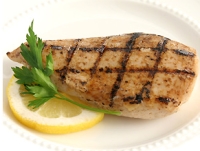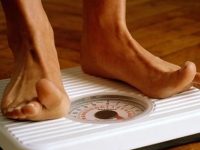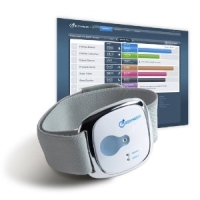 She ONLY would eat chicken breast and couldn’t handle it- no matter how many times she tried it there was no way it would not get stuck
She ONLY would eat chicken breast and couldn’t handle it- no matter how many times she tried it there was no way it would not get stuckPeople ask me lots of questions all the time. They ask me on line, at support groups, at seminars and also when I meet them on the street. I love questions because they give me the opportunity to learn something every time I answer. Sometimes I have to ask a medical professional before I can provide an answer. Frequently though I am able to answer from my personal experience and the knowledge I have gleaned from listening to everyone over the past 8 years. What I have noticed recently (I am sure it’s been that way forever but I am just paying closer attention at the moment) is that most answers directly relate to accountability in one form or another.
What do I mean by that? Let’s take the case of the “newbie”. Last night I had someone ask how am I supposed to eat when nothing wants to stay down? Oh my goodness - are you thinking what I’m thinking? Nope, she doesn’t have a slipped band or some other problem. She has seen her doctor and had everything “A’Ok’d”. Some specific questioning lead to the following discoveries:
 She ONLY would eat chicken breast and couldn’t handle it- no matter how many times she tried it there was no way it would not get stuck
She ONLY would eat chicken breast and couldn’t handle it- no matter how many times she tried it there was no way it would not get stuckWhat became clear to me in our conversation was that this woman thought she could manage her weight loss surgery her way. If I’ve learned only one thing in the past 8 years it’s that my way didn’t work. That’s how I got obese. That’s why I had a surgery. That’s why I followed the rules. That’s why my choices are my responsibility and the choices I make today definitely impact the outcome - or my choices will result in the quality of my life. This poor lady was getting in barely 30 grams of protein a day, but it wasn’t “her fault” because she was too busy to do anything about it, and besides, chicken didn’t “work” - it got stuck. But her coffee and protein bar did, and she could have her coffee with it because the label on the protein bar said she should have 8 ounces of water with it. I could go on forever, the excuses kept coming as to why anything except the doctor’s instructions - THE RULES- were important.
It came down to just one thing - a failure to accept accountability for what she was doing. Part of that is directly related to not making herself a priority in her life- everything else came first, even to the point of having hair being more important than being healthy. Major takeaway here- MAKE YOURSELF A PRIORITY. When you are number one you will value, not only yourself, but all of the choices that you make and looking through the filter of you being important can certainly make a difference in those choices. If you “think” you’re taking care of yourself, start keeping track of your intake and output - calories/protein/water/exercise and take a good hard look at what you see at the end of each day. I am NEVER perfect, and that’s okay. I do know what I am eating and drinking every day. I keep track of it. I am accountable for myself - good choices or bad choices, it’s in my hands, NO EXCUSES. I like it that way.
Now let’s take a look at the WLS “veteran”, somewhere on the journey who has hit a plateau, maybe for two weeks, maybe for 2 months. What questions do I hear from these folks?
Now, you ask, how do I equate these questions with personal accountability? Easy….What does I’m doing everything right mean? I don’t know so I then ask the following:
The answers I get range from enough to I don’t know, and frequently include the words about or around in the replies. I don’t know about you, but when I have a goal, and when I need to do certain things to achieve that goal I write down what will get me there. For example, so far today I have had 60 grams of protein, 525 calories, 30 ounces of water, 20 minutes on the elliptical and 25 minutes of swimming laps, and a total of 5700 steps taken. I’m short on the water so I can work on it. Had I not tracked it, I probably would have a rough idea, but it sure would have been easier to “blow off” the hydration thing and just continued on with my day.
 Any time you “hit a plateau” or maybe even (heaven forbid, but reality happens) gain a few pounds it works to take a good hard look at absolutely EVERYTHING that goes into your mouth (including that bite of your son’s sandwich or your sister’s cookie) and REALLY understand how many calories and how much protein you are getting daily. Then look at your hydration and finally at your exercise. Do you see any areas where you have room for improvement? How do you plan to change them? Take on at least one area a week to improve and I bet you kick that plateau into the dust or get back into your cycle of losing weight. It’s all about personal accountability.
Any time you “hit a plateau” or maybe even (heaven forbid, but reality happens) gain a few pounds it works to take a good hard look at absolutely EVERYTHING that goes into your mouth (including that bite of your son’s sandwich or your sister’s cookie) and REALLY understand how many calories and how much protein you are getting daily. Then look at your hydration and finally at your exercise. Do you see any areas where you have room for improvement? How do you plan to change them? Take on at least one area a week to improve and I bet you kick that plateau into the dust or get back into your cycle of losing weight. It’s all about personal accountability.
What could be easier? Truth be told, ALMOST ANYTHING. What could be harder? Not much. It’s simple in theory, but accepting personal accountability for all of our choices is possibly one of the most challenging acts of our post weight loss surgery lives. We have a tool that clearly helps with portion sizes, but we can all figure out pretty quickly how to eat around any surgery. It’s the mental game we need to perfect to maximize our lives. Nothing different than before weight loss surgery - just an altered mental game, much as our bodies have been altered. That immediate weight loss, either with our pre-op “diet” or our post-op food progressions usually gets us losing weight and starting to feel like this could be real, this time there is hope, and I think I can actually do it. Positive thinking goes a really long way here.
Am I still too tired to get up and go to the gym? You bet I am, but I do it anyway, most of the time, until I have replaced the habit of staying in bed with getting up and going to the gym. Now 75% of the time I am up and out of bed in a minute or two instead of a half hour or so, and I have the time to get coffee and then go work out before the rest of my day begins. I choose an egg white omelet with veggies and salsa on the side instead of a meat and cheese omelet covered with chili and biscuits and gravy on the side. And, by the way, no potatoes or toast with that, thank you! Could I eat the “old way”? Nope, couldn’t possibly finish it all. Would I try? Nope, but I would pick at my husband’s plate if he ordered that way and I was not “on my game” at the restaurant. How would the outcomes differ? Substantially. Choosing getting up and going to the gym and choosing the “light” version of breakfast will contribute to my long term health, my long term weight loss and maintenance of that loss, and contribute to the new habits I am choosing to create to get healthy and stay that way. I am making a personal choice, that is I am being personally accountable for my actions as I play and win the mental game.
Now you ask, how do I keep track of it all? I used to write it down. For the first 2 years after surgery I journaled religiously in a little book writing down every morsel of food, every drop of liquid that passed between my lips. This helped me understand the direct relationship of my choices and my results, and motivated and inspired me to achieve the “results not typical” of 250 pounds lost. But that was in 2004. Today it can be easier. We have devices that we can input information into and they track for us.
 The “device” that I use for tracking my calories/protein and my exercise calories expended and steps taken is a Body Media Fit Armband. I use the Link so I can track on my smart phone as well as on my computer, but there are a variety of ways to have this armband work to meet your needs. The Body Media FIT also tracks the quality of your sleep which has proven to be a significant factor in weight gain or loss. To lose weight you should know calories in, calories out and sleep quality. The Body Media FIT collects this data all day and night. The right information can help you take control, be accountable and achieve your weight loss, health and quality of life goals. The armband is clinically proven to significantly improve weight loss by up to 3 times as compared to behavioral support alone.
The “device” that I use for tracking my calories/protein and my exercise calories expended and steps taken is a Body Media Fit Armband. I use the Link so I can track on my smart phone as well as on my computer, but there are a variety of ways to have this armband work to meet your needs. The Body Media FIT also tracks the quality of your sleep which has proven to be a significant factor in weight gain or loss. To lose weight you should know calories in, calories out and sleep quality. The Body Media FIT collects this data all day and night. The right information can help you take control, be accountable and achieve your weight loss, health and quality of life goals. The armband is clinically proven to significantly improve weight loss by up to 3 times as compared to behavioral support alone.
As a basically technically inept person there was a brief learning curve for me with my FIT armband, as it and I got to know each other. Now I can plug in my meals and snacks quickly, and check on my exercise progress throughout the day. It has actually motivated me (just by being there with numbers in black and white) to get up from my desk and go for a series of 5 minute walks throughout my day. Somehow when you know you are going to be documenting what went in your mouth better choices are a tiny bit easier to make. (Notice I didn’t lie and say simple, or a breeze, or that the armband does anything for you directly) Much like our weight loss surgeries themselves, my Body Media Fit ArmBand is just another tool I keep in my arsenal of tools as I manage my life, my weight loss and my personal fitness goals.